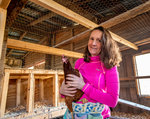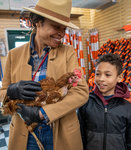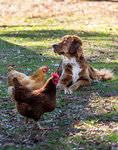





Christi and Jim Hartman grew up in the Missouri countryside and are accustomed to open spaces. Eight years ago, they bought a 17-acre farm in Linden that came with a pond and a barn.
“We love the quiet,” says Christi. “We love being out here.”
Three years ago, they added chickens because they figured it might just be cool.
“We have plenty of property, including a pond,” she says. “We got ducks and chickens at the same time, and my husband built two coops out of the barn for both of them.
“Raising chickens is pretty easy. We started out with 10 of each and now we have 23 ducks, two roosters and eight egg-laying hens. We will probably get a couple more chickens this year.”
Along with the cool factor and the chance to take advantage of the great outdoors, the Hartmans now have another motive for raising chickens: The price of eggs at the supermarket has risen dramatically in the past few months.
That, in turn, has sparked renewed interest in raising backyard chickens to supply those sunny-side-ups and scrambled breakfasts without adding to the grocery tally.
The Hartmans’ chickens are free-range, meaning they can roam the yard, reducing the need to spread a lot of feed for the chicks.
“They have plenty of bugs and don’t need as much feed,” says Hartman. “We keep their water clean and clean their coop at least once a week. I put down fresh cedar chips for them and sprinkle Diatomaceous Earth, which is a food-safe powder that helps kill bugs, mites, fly larvae. It helps keep the chickens healthy.
“We’ve had some attacked by hawks, and we use a wound spray to treat them and keep them confined until they get better,” says Hartman. “Because they are free-range, it’s harder to protect them from predators like foxes and coyotes.”
She says adding cameras in the coops to catch predators and automatic doors to ease access has been a lifesaver when she and her husband can’t be at home to guard the flock.
“We have automatic doors that open and close. Once you train the chickens to when it opens and closes, they know and will come and go. They are ready to get out when it opens in the morning and then come back before it closes at night to put themselves to bed. When you are training, you have to watch them, just in case, but they learn pretty quickly,” says Hartman.
Her advice for anyone who wants backyard chickens is to not start with babies, install automatic doors and join Facebook groups of people who share in their interest.
“The groups are great for advice, and people are always willing to make sure you are doing things right. We started with baby chicks, but I would tell others to start with pullets, which are like teenagers. Starting with baby chicks takes constant care and heat lamps. They also don’t lay eggs for a while,” says Hartman.
Hartman says flock swaps and chicken and rooster sales are frequently posted on Facebook groups like NC Chickens and Ducks.
“You can get them for $10 a bird, and it’s a whole lot less work. Our chickens just started laying again, so we are getting four to six eggs per day. But we will soon get at least one a day per chicken,” says Hartman.
She uses water and pickled lime to preserve about 100 eggs when the chickens are not laying in the winter.
“It’s like a fresh egg after you rinse off the pickling and crack the shell,” says Hartman.
The Hartmans sell to people at their church, to customers of her husband’s honey business and to Facebook friends who are looking for farm-fresh eggs.
Her husband is now a full-time bee farmer, selling honey through his business, Secret Garden Bees. An Army veteran and former civilian contractor, he also volunteers with nonprofit groups like Boots to Agriculture to help military veterans transition into farming.
Their son Tristan, 17, and daughter Abbey, 14, a senior and freshman, respectively, at Berean Baptist Academy in Fayetteville, help with the chickens too.
“They help feed them and collect the eggs. The chickens don’t always go in the coop to lay eggs in the nesting boxes, so you find them laying eggs in other places and have to look,” says Hartman.
The Hartmans say they have loved raising chickens and the work is worth it at the end of the day.
“If you want farm-fresh eggs to save time going to the store or not needing to deal with rising prices, chickens are easy. You won’t get rich selling eggs, but it is nice to have farm-fresh eggs when you want them,” says Hartman.
Growing trend
Interest in raising chickens in the Fayetteville area is growing, as it is across the country.
More than 100 people gathered in the back room at Bell’s Seed Store downtown in early February to hear the Dodson and Brattin families lead a free how-to seminar on backyard chickens.
Kyle and Kelly Dodson have three children: Baker, 15; Maddie, 9; and Elsie; 8. They lived in the Kings Grant neighborhood in North Fayetteville when the COVID-19 lockdown came in 2020.
“Neither one of us grew up raising chickens, but in 2020, we were bored and looking for something to do,” says Kelly Dodson. “We home-school, so this is a big responsibility for the children. We really enjoy it and, in learning about all of this, we have expanded from egg-laying hens to meat chickens as well.”
When the family moved to Vander, they became neighbors with Rob and Julia Brattin and their children, Liberty and Charlee, who also raise chickens.
At the Bell’s Seed Store workshop, the children started the class with a few chicken jokes. The audience began to lean in as Rob Brattin started talking about the importance of learning where food comes from and having a supply of eggs and meat through raising chickens.
“Raising chickens is simple, and then they produce a constant supply of eggs,” said Brattin.
But Brattin said his family’s decision to raise chickens was not just about the price of eggs. It was about self-sustainability and teaching his children about responsibility.
“We stopped learning where our food comes from, so we decided as a family to change the paradigm. We take care of the chickens so they can take care of the ground. It’s a win-win,” said Brattin.
He told the crowd that he and his wife wanted to give their children a better life.
“We wanted to give them a future. Wise men pass on an inheritance more than money. This will last generations,” said Brattin.
Many in the audience nodded in agreement.
“Six chickens is a good amount to start with, but I would suggest getting chickens according to the space you have,” said Brattin.
Brattin outlined different options for raising chickens, including how to keep them caged in spaces like a back porch or the backyard and how to let them be free-range so they can roam and eat grass and bugs.
“With chickens, if you need to keep them in a cage, it’s easy. You can use what you have around you too,” said Brattin.
He said old furniture and chicken wire can be used to make a proper chicken coop as long as it is kept clean and gives the chickens enough space to scratch and move.
One trick to help caged chickens produce more eggs is to put a rabbit in a cage on top of theirs. That bit of advice surprised some in the workshop audience and prompted a few giggles.
“The chickens are attracted to the rabbit waste and start to produce more,” said Brattin.
He said there are options on what types of birds you can keep, from hybrid chickens, which lay more eggs than most, to a heritage breed. Locally, he suggested, the Vander Feed Store sells full-grown, ready-to-lay hens for $20 each or two for $30. Those chickens will start producing eggs right away at a rate of 300 to 360 a year, he said.
Security can be a challenge for people raising backyard chickens, said Kyle Dodson.
“The big thing is that chickens don’t run from predators, and we have foxes, coyotes, hawks and others to think about,” Dodson said. “So, you need to add chicken wire and sometimes have more secure builds or, like, a greenhouse. Of course, if you want to be fancy, you can add things like solar-powered doors.”
As the class ended, several participants came up to the Dodsons and the Brattins to ask follow-up questions.
Some of them said they had begun raising chickens in the past year; others were planning to try their hands at it.
Tony and Melissa Stirewalt said they have nine laying hens and a rooster at their house near Raeford. They were looking for tips.
“We repurposed an old playhouse set, and so our coop looks like a little cottage,” said Melissa Stirewalt.
They decided to get chickens to help teach their two children — Katie, 15, and Colton, 9 — to cope with responsibility.
“They are supposed to help take care of them, but once we got them, I didn’t realize how much fun it would be,” she said. “The chickens all have different personalities. We are getting excited about summer when they will start producing more eggs.”
Jonathan and Sassy Womble attended the workshop with their 9-year-old son, Eli. They planned to buy chickens within a few weeks.
“We’d like to learn to live off the land, so we thought we’d start with chickens. Of course, we’d love to buy land and do it on a larger scale one day,” said Sassy Womble.
As she watched her son hold a chicken, she added: “We want to get back to roots and nature and how to provide.”